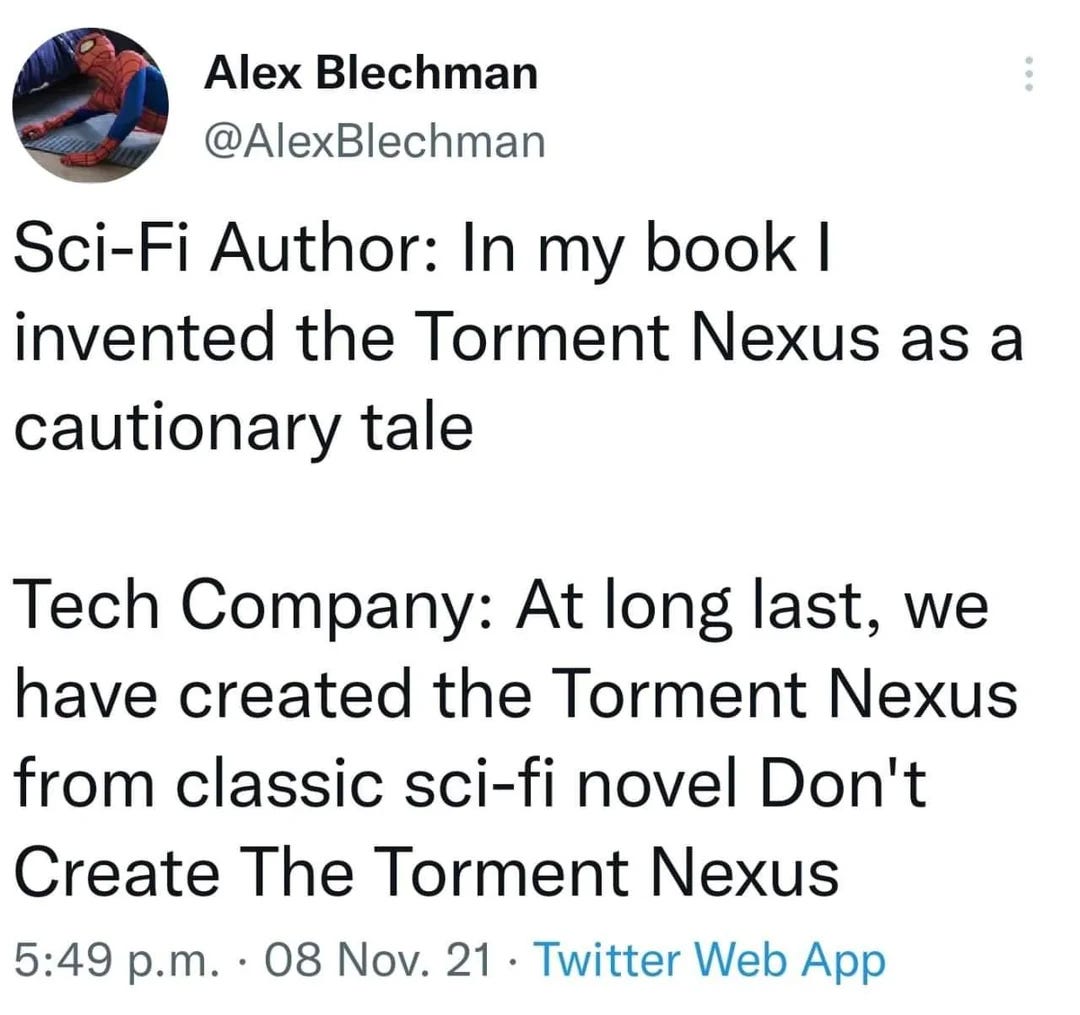I Built The Torment Nexus (Political Podcast Edition)
Six years ago cartoonist Zach Weinersmith made a joke about a 24/7 AI podcast endlessly talking about polling numbers. I've made it a reality.
Let’s be clear: this is all Zach Weinersmith’s fault. Zach seems generally a good guy: he’s the man behind the webcomic Saturday Morning Breakfast Cereal and, with his wife Kelly, wrote a great book on space colonisation. But when I was aimlessly browsing the internet a few days ago, I came across the comic he published in 2019.
Obviously this idea sounds absolutely horrible. But in the far distant past of about six years ago, it was also mostly silly and infeasible – it was essentially a post saying “wouldn’t this be a horrible way to use a technology” and “imagine being so broken by politics and the internet that you might listen to this”.
In other words, it reminded me of a famous social media post:
Zach’s 24-hour polling podcast is his version of the Torment Nexus, and he’s the sci-fi author. So I wondered what might happen if I took on the role of the tech company. More specifically, I wondered whether “AI” had advanced enough in the few years since 2019 that I could just ping the webcomic into ChatGPT and ask it to create what was being described therein.
Spoiler warning: it could, sort of. You can listen to the results right here, right now – I am now the proud(?) owner and creator of an entirely AI powered 24/7 podcast in which “Alex” and “Blake” eternally discuss Donald Trump’s approval ratings and the impact recent headlines will have on them.
It’s quite possibly the worst thing I have ever done. I think I love it.
The whole process was also incredibly telling – to me, at least – about the gap between what AI ‘can’ do now in theory and what it can actually do in practice. I tried to follow a rough rule here of asking the AI to give extremely simple, non-technical and step-by-step instructions throughout, which I would then follow and execute (partly because I wasn’t using agentic AI and partly because I wouldn’t trust it with either my card details or various login credentials even if I did).
I also resolved not to fix problems myself: by and large if the AI told me to do something stupid I would do it. When something didn’t work or gave me an error message I fed that back into ChatGPT (I was using o3) and let it deal with the problem. Mostly.
The basics worked well, at least at first. ChatGPT successfully read the comic and understood the 24/7 podcast concept. I had to explain I wanted it to make it, explain every step in detail (including writing all relevant code), and to do so for a running cost of less than $30 a month. I also had to clarify that I wanted it to have the voices discussing real headlines (it initially took “nonsense” literally) and that there should be two characters having a conversation, instead of one character monologuing around the clock, forever.
ChatGPT came up with a basic plan: I’d buy some “dirt-cheap hosting” and install the audio streaming software Azuracast onto it, alongside a step-by-step workflow took called n8n. We’d then also install some free AI voices using Piper.

After a few false steps, ChatGPT realised there isn’t currently a US presidential election and so suggested we use Donald Trump’s approval ratings instead. After failing to find any good JSON or CSV feeds with these, it settled on getting them from Wikipedia, while headlines come from Google News.
Every five minutes, we would pull the latest polling (because it’s Wikipedia, this hasn’t changed once yet), three recent headlines, and use these to generate a five minute script. This would then be voiced by AI, merged into a single MP3 player, and then played via an internet radio playlist that refreshed every time the audio was updated, creating a rolling 24-hour radio.
I’m making all of this sound simple. The reality of it was that it took hours, because nothing worked exactly like ChatGPT thought it should – it would hallucinate URLs where feeds of approval polling existed, or ‘forget’ that some APIs were rate-limited or not free any more.
On multiple occasions o3 ‘forgot’ that it is a model able to access the live internet – if nudged in a prompt with a reminder it could check URLs live, or look for up-to-date documentation, it would check the internet for the next few prompts, before ‘forgetting’ again.
ChatGPT would also get obsessed with using a particular tool for the job, not stepping back to work out what it was actually trying to do – because, of course, for all that it’s sold as a ‘reasoning’ model it isn’t actually doing any reasoning.
o3 had decided it would use the free software Piper, with two downloaded voices, to turn a GPT-generated script. The problem was that this simply couldn’t install properly in a way that n8n (which was doing the workflow) could access. I spent two hours with o3 relentlessly trying the same four solutions to this, then ‘forgetting’ which ones we’d tried before and looping around again.
It was only when I broke my rule of just doing what the AI told me to do and reminded it I’d say the cost needed to be low, not free, that o3 remembered we could just use…OpenAI’s text to voice service. Eventually, the process ChatGPT had set up worked – it’s over-engineered and far more convoluted than it needs to be, but other than my intervention reminding an OpenAI product of its own capabilities, the AI did it all itself.

I include all of that detail mainly so that this post doesn’t come across as a breathless “oh my GOD, artificial intelligence is such a genius now it set up a whole new form of podcasting in 10 minutes” post. It did everything badly and slowly and someone with (1) any respect for themselves and their own time, (2) a normal human attention span, or (3) actually not having pretty good technical skills, wouldn’t have actually finished the project.
But all the same, it did feel strange to have built in the space of a few hours a fully automated terrible podcast, for a low cost. The hosting is $12 a month, there is no cost for any of the content APIs used, and the cost of the GPT calls for the script and the text-to-voice are running at about $1.50 a day.
And the product is truly, deeply, terrible. It is everything the original comic promised and less – though I’ll admit I tweaked it slightly, to ask the hosts to disagree with one another at least once every five minutes, and to use each other’s names now and then).
If you listen for more than two or three minutes, the constant repetition of the same opinion poll alongside different headlines feels uncanny. But after another few minutes it just starts to feel…normal. I realised at one point I’d been listening to the radio for about 30 minutes, like the weird polling ASMR Zach Weinersmith had envisioned.
Then something slightly horrifying happened: I actually learned about some breaking news from it – that the Senate had passed Trump’s Big Beautiful Bill. My creations “Alex” and “Blake” (ChatGPT named them) had taught me something. Suddenly I knew how Doctor Frankenstein must have felt.
Early reviews include:
“there's a point a few minutes in where them saying "Alex" and "Blake" in every sentence tips over from passive aggressive to outright threatening, you start hearing them in italics”
“why would you do this”
“This is horrendous. You are evil incarnate.”
“This is awful. Incredibly impressive but awful.”
“It gives me a physical full body cringe”
“been listening to this for almost ten minutes and forgot what I was listening to…congratulations on your torment nexus”
Do experience it for yourself.
I feel I should try to bring things to some Big and Meaningful conclusion here, but I’m not sure there is one. Sometimes a side project is just silly and dumb, even if it does illustrate how quickly something shifted from a joke to something entirely achievable by tech.
This could very easily be improved, with minimal skill, into something that might even by actually listenable. I could at fairly low cost run an AI radio empire, tailored to different political leanings. There’s probably some way to horribly AI animate Alex and Blake so that it could be a 24/7 YouTube politics livestreaming channel. The possibilities are endless, but the final take home is surely best left to Jeff Goldblum:





Now do this for Arsenal transfer news and you will have a massive hit
We're at the "some tech guy did it for fun" stage. This leads into the "a startup company did it for cash" and "a huge corporation did it to crush humanity" stages, which should follow in short order